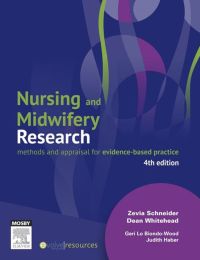Foreword
Preface
Editors
Contributors
US Contributors
Reviewers
Acknowledgments
Section One Research awareness
Chapter 1 The significance of nursing and midwifery research 3 Zevia Schneider
Background to evidence-based nursing and evidence-based midwifery
Research awareness and consumerism — how this book accommodates these
What is evidence?
Linking theory, education and practice to nursing research
International and Australasian nursing research — a brief history
Professional organisations in Australia and the Asia-Pacific region
International, Australian and New Zealand journals
Educational preparation for conducting research
Clinical programs of research
Promoting nursing and midwifery research
Other important factors in facilitating effective nursing and midwifery research
Collaborative research teams
Clinical governance and clinical audit
Future directions for nursing and midwifery research
Summary
Chapter 2 An overview of research theory and process Dean Whitehead
Research theories, philosophies and paradigms
Choosing a paradigm
Theoretical and conceptual frameworks
Research process and research design
Summary
Chapter 3 Searching and reviewing the research literature Dean Whitehead
Types of research literature resources
Conducting a search of the research literature
Reviewing the research literature
Summary
Chapter 4 Identifying research ideas, questions, statements and hypotheses Zevia Schneider and Dean Whitehead
Developing and refining a research idea
Defining a specific c problem area
The significance of research problem statements to nursing or midwifery
Reviewing relevant literature
Operational definition
Hypothesis testing
Summary
Chapter 5 Ethical and legal issues in research Martin Woods and Zevia Schneider
Ethical and legal considerations in research: an historical perspective
Summary
Section Two Research appreciation and application
Chapter 6 Common qualitative methods Dean Whitehead
Why is qualitative research useful?
The main approaches to qualitative research
‘Traditional’ approaches to qualitative research
Grounded theory
Ethnography
Other ‘common’ qualitative methods
Keeping up with qualitative developments
Summary
Chapter 7 Sampling data and data collection in qualitative research Violeta Lopez and Dean Whitehead
Sampling techniques and procedures in qualitative research
Data collection in qualitative research
When have enough data been collected?
Summary
Chapter 8 Analysing data in qualitative research Thomas Harding and Dean Whitehead
Key issues regarding analysis of qualitative data
Conducting qualitative analysis: general principles
Managing data analysis
Writing up data analysis
Styles of data analysis
Other styles of analysing qualitative data
Qualitative meta-synthesis
Trustworthiness
Reporting and disseminating qualitative data findings
Summary
Chapter 9 Common quantitative methods Linda Shields and Roger Watson
Concepts underpinning quantitative research
Observational designs
Quasi-experimental designs
Experimental designs
Randomised controlled trials
Summary
Chapter 10 Sampling data in quantitative research Zevia Schneider and Murray Fisher
Sampling concepts
Summary
Chapter 11 Quantitative data collection and study validity Sonya Osborne and Zevia Schneider
Measuring a variable of interest
Conceptual and operational definitions
Types of data collection
Study validity
Summary
Chapter 12 Assessing measuring instruments Brigid Gillespie and Wendy Chaboyer
Measurement error
Performance characteristics of an instrument
Establishing evidence about the content of a measure
Establishing evidence of relationships between the measure and other variables
Responsiveness
Developing a measuring instrument
Assessing instruments
Summary
Chapter 13 Analysing data in quantitative research Murray Fisher and Zevia Schneider
Descriptive statistics
Levels of measurement
Normal distribution
Inferential statistics
Probability and the level of significance
Meta-analysis
Structural equation modelling techniques
Summary
Chapter 14 Mixed-methods research Dean Whitehead and Zevia Schneider
What is mixed-methods research?
Methodological triangulation/pluralism
The value of mixed-methods research
Limitations associated with mixed-methods research
Action research
Delphi technique
Case study approach
Q methodology
Summary
Chapter 15 Critically reviewing research studies Zevia Schneider
Critical reading
Critical review of qualitative research studies
Critical review of quantitative research studies
Summary
Chapter 16 Applying research knowledge: evidence-based practice, practice development and knowledge translation Bridie Kent and Brendan McCormack
Why change practice?
Different approaches to practice change
Being informed by evidence
Important factors for evidence implementation
Knowledge translation in practice
Summary
Section Three Conducting primary research
Chapter 17 Writing proposals and grant applications Zevia Schneider
What is a research proposal?
Planning a project
Writing a proposal
Ethical considerations
Dissemination of findings
Budget
Submitting a proposal for review
Research committee review and HREC review
Funding sources
Summary
Chapter 18 Managing a research project Ruth Endacott and Dean Whitehead
Becoming involved in a research team
Managing a research team
Managing research participants
Managing the study data
Managing the budget
Managing a multi-national project
Trials registries
Writing project reports and publications
Completing the study
Summary
Chapter 19 Writing and presenting research findings for dissemination Dean Whitehead and Zevia Schneider
The importance of disseminating research findings: ‘publish or perish’
Barriers to publishing
Overcoming the barriers towards publication
The process and structure of writing for peer-reviewed publication
Other forums for research dissemination
Summary
Glossary
Index




